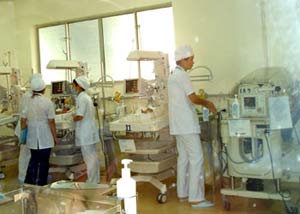Newborns can contract purulent meningitis if the mother suffers from infections of the urinary and genital tract, such as urinary tract infections, vaginitis, or vulvitis during pregnancy without receiving treatment.
Recently, the Central Obstetrics Hospital has reported a surge in cases of purulent meningitis among newborns, particularly in May, which saw around 30 infected infants and one fatality. This dangerous disease currently has no preventive vaccine. According to Dr. Le Thi Hoang Yen, Deputy Head of the Neonatology Department at Tu Du Hospital in Ho Chi Minh City, newborns can contract purulent meningitis from two main sources: maternal transmission or environmental infections, with inadequate sterilization conditions in hospitals being the primary cause.
 |
| Newborns being treated at the specialized neonatal department of Children’s Hospital I in Ho Chi Minh City. (Photo: M.L.) |
“Newborns will experience sepsis before progressing to purulent meningitis,” Dr. Hoang Yen stated.
Mothers can transmit the illness to their infants if they have urinary and genital tract infections during pregnancy. In reality, this is one of the most common conditions among pregnant women, yet it often goes untreated. Additionally, maternal infections from TORCH viruses, which can lead to fetal infections, are another contributing factor to newborns developing purulent meningitis after birth. TORCH is an acronym for several viruses: Toxoplasma, Syphilis, Gonorrhea, HIV, Tuberculosis, Rubella, Cytomegalovirus, and Herpes virus…
Newborns are also at risk of contracting purulent meningitis from their environment, particularly from family members and hospital settings. Adults with throat infections who come into contact with the infant or those who hold the child without proper hygiene can also contribute to the spread of this disease.
Dr. Hoang Yen emphasized that overcrowded hospital environments and poor sterilization practices create ideal conditions for newborns to contract sepsis, which can subsequently lead to purulent meningitis. Within a hospital, if just one infected infant is not isolated in time, purulent meningitis can spread rapidly and result in an outbreak.
If newborns with purulent meningitis are detected early and respond well to antibiotic treatment, they typically do not suffer any long-term complications. Conversely, if treatment is delayed, children may experience hearing loss, paralysis, blindness, cognitive deficits, and other impairments.
As there is currently no vaccine available, preventing purulent meningitis relies heavily on the awareness of adults. Healthcare workers must adhere to proper dress codes and handwashing protocols. In maternity hospitals, it is crucial to minimize visitor access. “Individuals who are ill, even with a common cold, should avoid contact with newborns because their mucous membranes are extremely delicate and easily susceptible to infections,” Dr. Hoang Yen cautioned.
Additionally, expectant mothers should follow medical advice closely to detect and treat any conditions during pregnancy, thereby minimizing the risk of transmitting infections to their infants.
Clinical signs indicating a newborn may be suffering from sepsis and purulent meningitis include sudden lethargy, decreased feeding or refusal to feed, fever or hypothermia, poor digestion, and frequent vomiting. If any of these symptoms are observed, the infant should be taken to a hospital with a neonatology department for prompt examination.
My Lan

















































